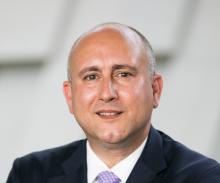It’s been a big week for Saudi Aramco. The company delivered its first ever half-year financial report. It hosted its first ever earnings call. And it signed the biggest-ever inward investment deal with India.
The surface facts are very positive. Earnings of $46.9 bn in the first half of 2019 cemented its place as the world’s most profitable company, a higher figure than Exxon Mobil, Shell, Chevron, BP and Total – its five largest competitors in the private sector – combined.
Despite a stubbornly low oil price, Aramco remains an efficient cash-generating leviathan, so much so that it is an integral part of Saudi Arabia’s fiscal planning infrastructure. It disclosed that almost its entire first-half earnings would be paid to the state in the form of a regular and ‘special’ dividend.
Its deal with Reliance Industries of India is, if anything, even more impressive. It will take a 20 percent stake in India’s biggest company’s refining and petroleum-chemical business, and is paying $15 bn to do so. The deal secures a large customer for many years into the future, and complements similar transactions with China, South Korea and Malaysia.
The future oil production of Saudi Arabia has secured customers across Asia, then, and Aramco’s CFO Khalid Al Dabbagh was bullish on the analyst call, predicting a strong and certain outlook for the company. This has led to much speculation that the postponed but much-awaited IPO of Aramco may be drawing closer; but key questions on this long-running topic remain unanswered – in particular around the future of its gargantuan dividend.
What will be the dividend policy should Aramco go public? Will future ‘special dividends’ be available to the holders of publicly traded shares? Or will the Saudi government be the only recipient of ‘special dividends’ or even the ‘ordinary dividends’ from Aramco? If Aramco makes its lucrative dividend available to shareholders other than the Saudi government, this will add hugely to the appeal of holding Aramco stock. On the other hand, if Aramco continues to fund the Saudi government through a dividend that is unavailable to other shareholders, then investors could very well find Aramco shares a far less lucrative prospect.
Likewise with its Asian deals: all very well while the supply and price of oil are reasonable and abundant; but recent events in the Straits of Hormuz have shown how fragile that supply can be. In another symbolic yet significant development this week, Russia, with its far less risky oil distribution infrastructure, overtook Saudi Arabia in its foreign currency reserves. In energy matters, as in geopolitics, the status quo rarely lasts long.
In investor relations terms, too, this week’s disclosures left more questions than answers. Beyond a stated desire to proceed, the details of Aramco’s IPO remain unknown. As stocks around the world tumbled this week because of China-US trade tensions and the growing number of technical indicators of an impending recession, Aramco’s analyst call was scant on details as to how it will navigate these uncertain times. Lasting around 30 minutes, the call has been subject to much comment: Bloomberg’s headline was: Aramco puts the ‘brief’ in ‘briefing’.
The earnings call did not, it seems, provide much value add. And one possible reason for Aramco’s underwhelming first foray into analyst calls is that the event sounded a lot like it was orchestrated, with the spokespeople likely briefed by PR people and not the IR team. The normal investor relations techniques of disclosure – delivering the facts in a narrative that helps debt and equity investors better understand the company, tackling sensitive issues head on, and using details to underpin the story – were not followed.
Instead, Aramco seemed to rely on an uncritical audience happy to be spoon-fed the rosiest possible PR messages. Every person on the call would have had exposure to global markets, and would have been putting the Aramco story in the context of the current market volatility. Their out-take of the Aramco call was always going to be colored by the global market environment. What they got was an airbrushed version of the real picture.
The chief lesson from Aramco’s big week is that PR is not the same as IR. Aramco may get away with its PR approach in its first earnings call – after all, hosting a call is better than no call at all – but in the long run it will not. Investors’ antennas are fine-tuned to see right through the PR, ‘ever-bullishness’ and spin. And if there is no value add for investors tuning in to Aramco’s earnings calls, it is likely that they will stop attending altogether. Aramco will need to get comfortable with disclosing more, answering more difficult questions, and learning to understand and appreciate the skeptical perspective of its many stakeholders. It’s not personal – it’s just business.
Oliver Schutzmann is CEO of Iridium Advisors










